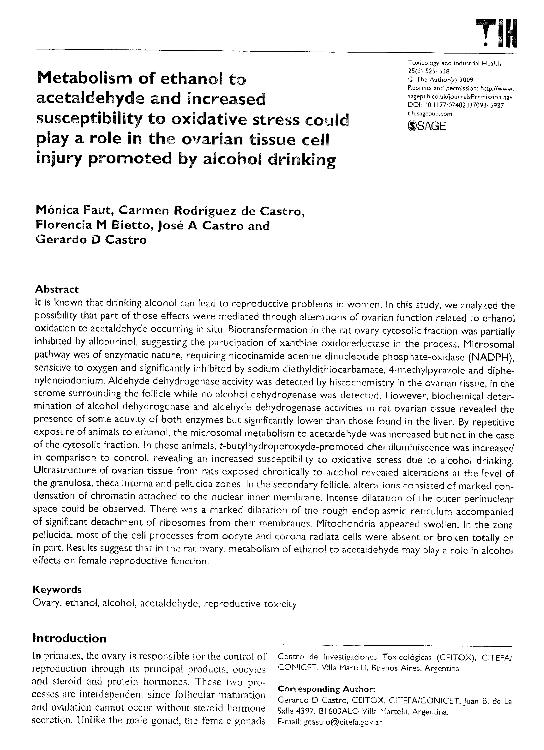Mostrar el registro sencillo del ítem
dc.contributor.author
Faut, Monica

dc.contributor.author
Rodríguez de Castro, Carmen
dc.contributor.author
Bietto, Florencia Matilde

dc.contributor.author
Castro, Jose Alberto

dc.contributor.author
Castro, Gerardo Daniel

dc.date.available
2019-08-21T23:04:07Z
dc.date.issued
2009-09
dc.identifier.citation
Faut, Monica; Rodríguez de Castro, Carmen; Bietto, Florencia Matilde; Castro, Jose Alberto; Castro, Gerardo Daniel; Metabolism of ethanol to acetaldehyde and increased susceptibility to oxidative stress could play a role in the ovarian tissue cell injury promoted by alcohol drinking; SAGE Publications; Toxicology And Industrial Health; 25; 8; 9-2009; 525-538
dc.identifier.issn
0748-2337
dc.identifier.uri
http://hdl.handle.net/11336/81950
dc.description.abstract
It is known that drinking alcohol can lead to reproductive problems in women. In this study, we analyzed the possibility that part of those effects were mediated through alterations of ovarian function related to ethanol oxidation to acetaldehyde occurring in situ. Biotransformation in the rat ovary cytosolic fraction was partially inhibited by allopurinol, suggesting the participation of xanthine oxidoreductase in the process. Microsomal pathway was of enzymatic nature, requiring nicotinamide adenine dinucleotide phosphate-oxidase (NADPH), sensitive to oxygen and significantly inhibited by sodium diethyldithiocarbamate, 4-methylpyrazole and diphenyleneiodonium. Aldehyde dehydrogenase activity was detected by histochemistry in the ovarian tissue, in the strome surrounding the follicle while no alcohol dehydrogenase was detected. However, biochemical determination of alcohol dehydrogenase and aldehyde dehydrogenase activities in rat ovarian tissue revealed the presence of some activity of both enzymes but significantly lower than those found in the liver. By repetitive exposure of animals to ethanol, the microsomal metabolism to acetaldehyde was increased but not in the case of the cytosolic fraction. In these animals, t-butylhydroperoxyde-promoted chemiluminiscence was increased in comparison to control, revealing an increased susceptibility to oxidative stress due to alcohol drinking. Ultrastructure of ovarian tissue from rats exposed chronically to alcohol revealed alterations at the level of the granulosa; theca interna and pellucida zones. In the secondary follicle, alterations consisted of marked condensation of chromatin attached to the nuclear inner membrane. Intense dilatation of the outer perinuclear space could be observed. There was a marked dilatation of the rough endoplasmic reticulum accompanied of significant detachment of ribosomes from their membranes. Mitochondria appeared swollen. In the zona pellucida, most of the cell processes from oocyte and corona radiata cells were absent or broken totally or in part. Results suggest that in the rat ovary, metabolism of ethanol to acetaldehyde may play a role in alcohol effects on female reproductive function.
dc.format
application/pdf
dc.language.iso
eng
dc.publisher
SAGE Publications

dc.rights
info:eu-repo/semantics/openAccess
dc.rights.uri
https://creativecommons.org/licenses/by-nc-sa/2.5/ar/
dc.rights.uri
https://creativecommons.org/licenses/by-nc-sa/2.5/ar/
dc.rights.uri
https://creativecommons.org/licenses/by-nc-sa/2.5/ar/
dc.rights.uri
https://creativecommons.org/licenses/by-nc-sa/2.5/ar/
dc.subject
Acetaldehyde
dc.subject
Alcohol
dc.subject
Ethanol
dc.subject
Ovary
dc.subject
Reproductive Toxicity
dc.subject.classification
Bioquímica y Biología Molecular

dc.subject.classification
Ciencias Biológicas

dc.subject.classification
CIENCIAS NATURALES Y EXACTAS

dc.title
Metabolism of ethanol to acetaldehyde and increased susceptibility to oxidative stress could play a role in the ovarian tissue cell injury promoted by alcohol drinking
dc.type
info:eu-repo/semantics/article
dc.type
info:ar-repo/semantics/artículo
dc.type
info:eu-repo/semantics/publishedVersion
dc.date.updated
2019-08-21T14:03:02Z
dc.journal.volume
25
dc.journal.number
8
dc.journal.pagination
525-538
dc.journal.pais
Estados Unidos

dc.journal.ciudad
Thousand Oaks
dc.description.fil
Fil: Faut, Monica. Consejo Nacional de Investigaciones Científicas y Técnicas. GP. CITEFA - Centro de Investigaciones Toxicológicas (I); Argentina
dc.description.fil
Fil: Rodríguez de Castro, Carmen. Consejo Nacional de Investigaciones Científicas y Técnicas. GP. CITEFA - Centro de Investigaciones Toxicológicas (I); Argentina
dc.description.fil
Fil: Bietto, Florencia Matilde. Consejo Nacional de Investigaciones Científicas y Técnicas. GP. CITEFA - Centro de Investigaciones Toxicológicas (I); Argentina
dc.description.fil
Fil: Castro, Jose Alberto. Consejo Nacional de Investigaciones Científicas y Técnicas. GP. CITEFA - Centro de Investigaciones Toxicológicas (I); Argentina
dc.description.fil
Fil: Castro, Gerardo Daniel. Consejo Nacional de Investigaciones Científicas y Técnicas. GP. CITEFA - Centro de Investigaciones Toxicológicas (I); Argentina
dc.journal.title
Toxicology And Industrial Health

dc.relation.alternativeid
info:eu-repo/semantics/altIdentifier/doi/http://dx.doi.org/10.1177/0748233709345937
dc.relation.alternativeid
info:eu-repo/semantics/altIdentifier/url/https://journals.sagepub.com/doi/10.1177/0748233709345937
Archivos asociados
